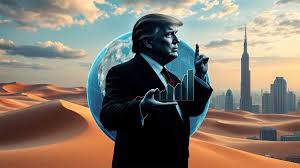In today’s world, international business is no longer just about balance sheets and market share—it is about geopolitics, influence, and strategic positioning. The global economy in 2025 is witnessing a tectonic shift as national interests, tech dominance, and energy independence redraw the boundaries of cross-border commerce.
🌐 Multipolar Trade: A New Economic Order
The post-COVID and post-globalization world has fractured old alliances and birthed new trading blocs. The U.S., under President Trump’s second administration, has adopted a sharp-edged “America First 2.0” policy. Tariff renegotiations with traditional allies, exclusions of China from strategic supply chains, and selective bilateral deals have created a ripple effect across global markets.
In response, the BRICS+ alliance—now including Saudi Arabia, the UAE, and Indonesia—has accelerated its internal trade initiatives, pushing forward a de-dollarization agenda and experimenting with commodity-backed currency mechanisms. The result? An emerging dual economic infrastructure where dollar dominance is increasingly challenged in energy and commodities.
🛢️ Energy & Infrastructure Diplomacy
Middle Eastern sovereign wealth funds are wielding immense soft power. Saudi Arabia’s $600 billion investment pledge to the United States, set to be finalized during President Trump’s upcoming Middle East tour, illustrates a pragmatic partnership: oil money meets infrastructure ambition. In parallel, Chinese-backed infrastructure projects under the Belt and Road Initiative (BRI) are pivoting toward Africa and South America, regions ripe with untapped potential and favorable diplomatic alignments.
Private capital is also reshaping the landscape. Family offices and private equity firms now command more agility than institutional giants, deploying capital across borders with remarkable speed—especially in sectors like renewable energy, AI, and advanced logistics.
💻 Technology: The New Battleground
Tech supremacy is now national policy. With the U.S. placing restrictions on semiconductor exports to China, and China responding by ramping up its domestic chip production, tech companies are at the center of a broader economic standoff.
Multinationals are adapting by “friend-shoring”—relocating supply chains to geopolitically friendly countries like India, Vietnam, and the UAE. This trend, once viewed as temporary risk management, is now a long-term strategy.
Meanwhile, African nations, particularly Nigeria, Kenya, and Rwanda, are attracting billions in fintech and digital infrastructure funding, positioning themselves as emerging tech hubs for the Global South.
💼 Corporate Diplomacy & Soft Power
In 2025, boardrooms are as political as parliaments. CEOs are now unofficial diplomats, navigating sanctions, currency volatility, and cross-cultural sensitivities. ESG is no longer a buzzword but a weaponized metric—used by both governments and shareholders to enforce ideological alignment.
Luxury conglomerates like LVMH and Richemont are hedging by investing in regions with stable political environments, while industrial players like Siemens and GE are engaging directly with governments to secure infrastructure contracts.
🧭 The Way Forward
As international business becomes a high-stakes chessboard, success belongs to those who master strategy, agility, and diplomacy. The age of globalization is not over—it is simply evolving. From Riyadh to Singapore, London to Lagos, capital is chasing both stability and opportunity. The smartest players are not just investing in markets—they’re investing in influence.
